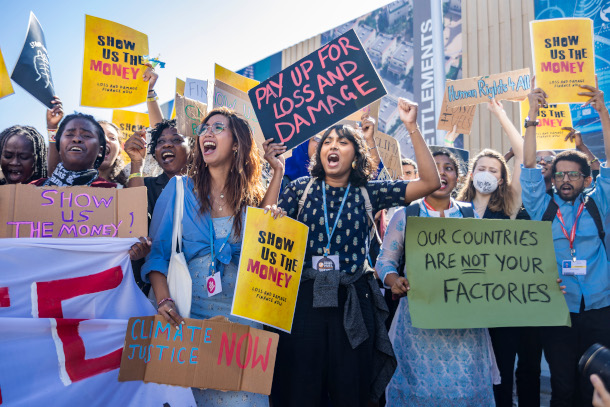What is loss and damage and why is it important?
The causes and impacts of climate change are widely accepted. We know that more carbon pollution in the atmosphere, primarily from the burning of fossil fuels releasing carbon dioxide, leads to an overall increase in global temperatures. This causes a wide variety of impacts including changes in the water cycle leading to both droughts and flooding; extreme weather events, such as heatwaves and severe storms; and rising sea levels threatening coastal populations. These impacts can sometimes be unavoidable and irreversible.
An incredible inequality exists between those responsible for this pollution, and those who bear the brunt of these life- and livelihood-threatening events. The poorest half of the world’s population are responsible for only 12% of carbon pollution, while it is estimated that developing countries in the Global South will shoulder 75% – 80% of the cost of climate breakdown. While this inequality has long been understood, acknowledgement and acceptance of responsibility has been much slower.
Acknowledging responsibility
The first step in acknowledgement came at COP16 in 2010 when Parties (countries) established a Green Climate Fund. It was set up to direct funding to developing countries, who have contributed least to the climate harming carbon pollution, to reduce their emissions further and facilitate development without substantially increasing their pollution. This would include projects such as widespread installation of solar panels. This fund would also allow for finance to be directed towards adaptation to the crisis including development of flood defenses as well as agricultural irrigation to compensate for reduced rainfall. In reality, the finance needed for this purpose is difficult to access and inadequate relative to the huge need.
While delivering $100billion per year by 2020 was the target set when establishing the fund, this was only realised two years later in 2022 with accusations that this is not new and additional money but relabeled existing funding. The goal of $100billion, while acceptable in 2010, is now irrelevant with the pot of money available as grants remaining woefully underfunded relevant to the need.
Conspicuous in its absence from the climate fund was any mention of Loss and Damage. Many consequences of climate change are now unfortunately unavoidable. Many of these impacts are also impossible to adapt to. Reducing emissions will stave off worsening impacts however we need to grapple with the reality that loss is inevitable. At an event at COP26 in Glasgow, a representative of the Pacific Islands spoke passionately about the loss of cultural identity and spirituality. Indigenous peoples don’t just lose their homes and livelihoods but the more intangible, but ultimately, core aspects of their lives. It was not until COP27, however, that an agreement was reached to establish such a fund with the details left to be agreed at COP28 this month, 13 years later.
Funding those Vulnerable to Climate Breakdown
Much work has been done in the past year to figure out the details which would make the Loss and Damage fund work for the most climate vulnerable. The wide gap between what developed countries were proposing as solutions and what developing countries were willing to accept needed to be narrowed to something palatable to both. Key agreements have been reached in pre-COP meetings with the final text to be formally accepted at COP.
While this is a huge step forward, compromises in the text have left the mechanism in a weakened state. Developed countries are ‘urged’ to contribute to the fund while more wealthy developing countries are being ‘encouraged’. The failure of developed countries to fulfill its promise to fund climate finance to the tune of $100billion per year by 2020 is fresh in the minds of those attending COP in Dubai. Trust will need to be earned back. Failure to compensate for the loss and damage caused to developing countries would make a mockery of these vital annual conferences.
Dr. Ciara Murphy
Environmental Delegate Environmental Policy Advocate
Jesuit Centre for Faith and Justice


